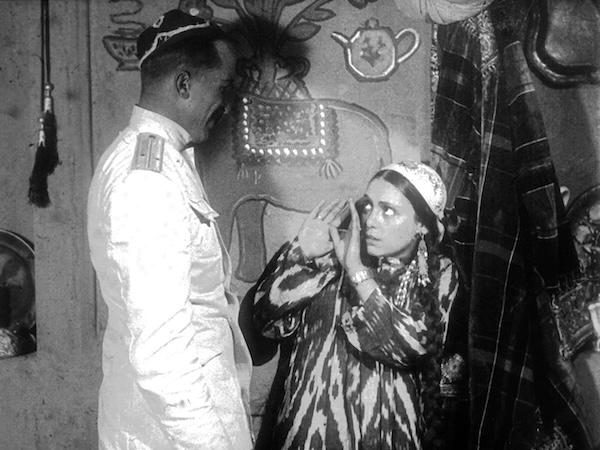MOXOV QIZ (UZ)/ ПРОКАЖЁННАЯ (RU) [The Leper] (USSR – Uzbek SSR, 1928)
Directed by Oleg Frelikh
Not long after co-writing the script for The Second Wife, Lolakhan Saifullina adapted a French novel whose author, Ferdinand Duchêne, also took women’s emancipation as a key theme for his books. Duchêne was a magistrate in Algeria, where he became fascinated by Arab and Berber culture and the intersection between traditional life and modernity; his Kamir. Roman d’une femme arabe first appeared in three issues of La Petite Illustration (27.03, 03.04, 10.04.1926) before being issued in book form shortly afterwards. Almost immediately it was translated into Russian, twice, once as Kamir and then as New Moon (Молодой месяц), as well as into Uzbek. It can’t be a coincidence that the same year Saifullina wrote her adaptation, the Bukharan writer and social activist Sadriddin Ayni published his translation of Duchêne’s novel into Tajik. Saifullina easily shifted Duchêne’s tragic love story between a French officer and an Algerian woman to a sun-scorched town in the Turkestan region at the beginning of the 20th century, preserving some of the original’s plot twists and imagery, most specifically the impossibility for a woman to be treated as an equal in a tradition-bound society.
In the spirit of the Soviet era, the film tells the story of a young girl (once again played by Ra Messerer) who, according to custom, marries into a rich house at a young age. Tillya-Oi (the name means “golden” in Uzbek) is close to the family of Colonel Karonin, the Russian district chief in Turkestan. At a party she meets the rich merchant Said-Vali, who makes her his wife, but his brutality leads her in desperation to ask the Colonel for help. The message is intercepted instead by the Colonel’s son Igor, who seduces Tillya-Oi. When her husband discovers her infidelity, he throws her out of the house and takes her to a religious court where he bribes the judges (in Central Asia, unlike Arab countries, Sharia divorce courts were uncommon). Shame forces Tillya-Oi’s father Akhmed-bai and his entire family to leave their native land, but they are unable to find peace in a new place, and disasters follow one after the other. Finally Akhmed-bai forces his daughter out, and she stumbles upon a leper colony. Horrified by what she sees she runs into the road, but riders, convinced she must be a leper, beat her to death.
Director Oleg Frelikh (1887-1953) had been an actor since 1914, turning to directing in 1924 and alternating between the two for most of the decade. With The Leper, his sixth film, he literally fills the screen with symbols, both in individual shots and through montage. The transition from the talisman that the mother sews for her daughter’s happiness to the billiard balls assembled into the same triangle, which the heroine’s future husband then smashes with a cue stroke, is a magnificent way to foreshadow how this brutish man will also smash the young heroine’s life.
Though Saifullina replaces Duchêne’s Arab girl with an Uzbek, transposing French colonial power with Russian officials, the script maintains much of the novel’s treatment of character and its themes, from the atmosphere of misogynistic suspicion to the Sharia trial through to the death of the heroine. While the idea of the Oriental woman oppressed by her despotic feudal husband aligned with Soviet ideology, in the case of The Leper the heroine’s tragic fate is determined not so much by social motives but fatal bad luck, which dogs her from the moment she marries until her terrible end.
Nigora Karimova

MOXOV QIZ (UZ)/ ПРОКАЖЁННАЯ (RU) [The Leper] (USSR – Uzbek SSR, 1928)
regia/dir: Oleg Frelikh.
scen: Lolakhan Saifullina, dal romanzo di/from the novel by Ferdinand Duchêne, Kamir. Roman d’une femme arabe (1926).
photog: Vladimir Dobrzhanskii.
scg/des: Pavel Betaki, Boris Chelli.
asst. dir: Evgenii Griaznov.
2nd photog: Boris Makaseev.
cons: Nabi Ganiev.
cast: Sh. Guliamov (Akhmed-bai), Ra Messerer (Tillya-Oi), Grigol Chechelashvili (Said-Vali), Rakhim Pirmukhamedov (Said-Murad), Andrei Fait (Igor Karonin), Vs. Liubushkin (Colonel Karonin), Nabi Ganiev, Sultan Pasha Abdullaeva.
prod: Uzbekgoskino.
uscita/rel: 10.04.1928.
copia/copy: DCP, ??’ (da/from 35mm?, ?? m., orig. l: 1860 m., ?? fps); did./titles: ??.
fonte/source: National Film Fund of Uzbekistan, Tashkent.


 Italiano
Italiano